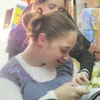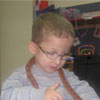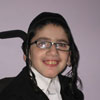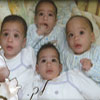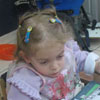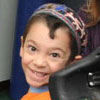RUCHAMA: THE CHILD WHO INSPIRED "MESHI" LEADS SCHOOL TO GREATER HEIGHTS
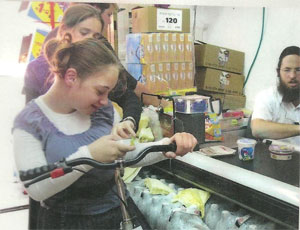 At Ruchama Feldman's birth in 1996, the tiny, premature blue-eyed baby's serious injuries left physicians convinced that she would remain paralyzed and blind for life. Yet her mother Lifsha mustered the enormous strength to fight to prove them wrong, and to make every solitary effort possible to improve Ruchama's life. Her battle ultimately spearheaded the 2001 creation of the Meshi Children's Rehabilitation Center, which pioneered extraordinary care for Ruchama and hundreds of her severely disabled young peers throughout Israel. Today Ruchama walks with aid, sees, and is a sensitive, loving friend to all. As she grows, so does Meshi---A class is added to the Meshi School each year for Ruchama and her classmates, the "senior" members of the 200-plus children in Meshi's early childhood center and school.
At Ruchama Feldman's birth in 1996, the tiny, premature blue-eyed baby's serious injuries left physicians convinced that she would remain paralyzed and blind for life. Yet her mother Lifsha mustered the enormous strength to fight to prove them wrong, and to make every solitary effort possible to improve Ruchama's life. Her battle ultimately spearheaded the 2001 creation of the Meshi Children's Rehabilitation Center, which pioneered extraordinary care for Ruchama and hundreds of her severely disabled young peers throughout Israel. Today Ruchama walks with aid, sees, and is a sensitive, loving friend to all. As she grows, so does Meshi---A class is added to the Meshi School each year for Ruchama and her classmates, the "senior" members of the 200-plus children in Meshi's early childhood center and school.
Ruchama was the ninth of Lifsha's 11 children. (Lifsha's sudden death in 2009 marked a tragic loss for her family, the Meshi institution, and all of Israel.) Born with a serious heart injury, Ruchama suffered complications from a surgical attempt to correctthe condition, leaving her stricken by cerebral palsy and grave optic damage. Her father, Rabbi Shlomo Feldman, began a worldwide search for therapies to treat her, even receiving special training in S. America as a therapist. Against all conventional medical odds, Ruchama soon began showing signs of progress, and Lifsha redoubled her efforts to provide the child with the intensive treatments she required. Yet Lifsha's attempts were constantly thwarted by nightmarish bureaucratic obstacles, compounded by the apparent ignorance of medical professionals towards new or existing treatment options. Ruchama was rejected for entry to any pediatric rehabilitation framework in the country.
THE BATTLE FOR RUCHAMA'S LIFE
At the start of her battle, Lifsha, an American-born Israeli who was a teacher, began a systematic one-woman campaign to locate and contact the best doctors and therapists in Israel. Along the way, she shared the information she gained with the myriad of parents she discovered to be in the same desperate situation. By the time Ruchama was two years old, Lifsha had assembled a group of eight other disabled children to form their own "Meshi" class in a newly-created nursery. Thanks to Lifsha's mother Hadassah Zuravin's fledgling but highly effective fundraising skills, Ruchama and her cohorts began attending a special program hosted by the Alyn Hospital in Jerusalem, where "Meshi" provided the funding for an unprecedented number of therapy hours. Four years later, Ruchama and her now 35 classmates became the stars of an impossible-dream-come-true event as they inaugurated the brand new Meshi Children's Rehabilitation Center in Jerusalem, 2001.
Ruchama, like all the children at Meshi, began a full range of intensive physical, occupational, speech, music and art therapy, provided by an excellent and enthusiastic staff of professionals. Despite her severe handicaps, Ruchama's happy disposition was a gift that cheered everyone around her, kids and staff alike.
"After Lifsha's death, Ruchama fell into a deep depression," recalled her teacher Avigail Van Reik. "Eventually, it was the music therapy that soothed her most and helped her to cope." In the early years, Ruchama made progress in walking, thanks to several operations and Meshi's very intensive physical therapy. But as she grew older, she became more spastic and less able to walk independently. Today she is primarily wheelchair-bound, although within the classroom and at home, she is able to maneuver with a walker. At Meshi, she climbs the steps to her classroom and loves to ride outdoors on the therapeutic bicycles.
MAINTAINING PROGRESS TOWARDS INDEPENDENCE
"Ruchama has achieved a great deal, considering her very low cognitive capabilities," said instructor Miriam Carmeli. "She is in a small group of girls her age, and she has learned to eat independently, and to speak and share her experiences with us. She learns vocabulary and problem-solving, and she does certain activities on the computer. She also enjoys her therapeutic horseback riding, and, of course, her music therapy."
Uvi Levy, who has been teaching at the Meshi School for the past four years, notes, "It's easy to make Ruchama happy. She loves anything connected with water, especially washing dishes. But she and her classmates get the greatest pleasure of all from our frequent outings beyond Meshi's gates. Ruchama's favorite destination is the neighborhood grocery store, where she selects the fruit yoghurt of her choice, asks the grocer how much it costs and pays him."
"At this point, we're working to keep Ruchama healthy and maintain her progress toward greater independence. Her continued physical therapy sessions are crucial, as are all of our efforts to broaden her world," said Avigail Van Reik. "Most important, we want her remain the happy, loved and loving child that she is.
"Above all, Lifsha was a parent who understood the pain of having a handicapped child. She gave her heart and soul to give Ruchama a better life. Ultimately, each and every Meshi child became like her very own, and that's Ruchama's legacy to this world."
